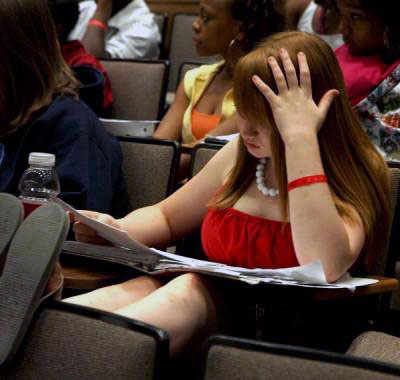All Nonfiction
- Bullying
- Books
- Academic
- Author Interviews
- Celebrity interviews
- College Articles
- College Essays
- Educator of the Year
- Heroes
- Interviews
- Memoir
- Personal Experience
- Sports
- Travel & Culture
All Opinions
- Bullying
- Current Events / Politics
- Discrimination
- Drugs / Alcohol / Smoking
- Entertainment / Celebrities
- Environment
- Love / Relationships
- Movies / Music / TV
- Pop Culture / Trends
- School / College
- Social Issues / Civics
- Spirituality / Religion
- Sports / Hobbies
All Hot Topics
- Bullying
- Community Service
- Environment
- Health
- Letters to the Editor
- Pride & Prejudice
- What Matters
- Back
Summer Guide
- Program Links
- Program Reviews
- Back
College Guide
- College Links
- College Reviews
- College Essays
- College Articles
- Back
Student Stress: Addressed
School, extracurricular activities, homework, sleep, repeat. This schedule represents a pattern that many top students across the country face daily. For students at these high schools, persistent stress is a reality of life. In order to perform well and live up to the expectations of parents, teachers, and peers, students sacrifice their mental and physical well-being. Some cope with the academic stress in healthy ways, but many others do not.
The most important variable in determining how individual students are affected by stress is how the student copes with the stress. Problem solving strategies are a positive method—a student who attacks the problem will feel more in control of the situation. This can include actively removing the stressor or taking steps to eliminate its effect. On the other side of the spectrum, passive strategies include avoiding the stressor altogether, which can cause negative emotional effects in the long term.
Substance abuse, which can be one of these effects, is surprisingly common in high-achieving students. Studies on students in high-performing schools show that the rate of substance abuse in those schools is significantly higher than the national average. And over two thirds of those students view substances use as a method of coping with stress. Unfortunately, substance abuse isn’t even the worst way of coping.
According to a recent survey conducted by the American Psychological Association, forty percent of teens report feeling angry as a result of stress. Thirty six percent feel nervous and anxious, and thirty three percent feel overwhelmed and depressed. These common issues affect student’s performances in school, home, and extracurricular activities and may result from unhealthy coping mechanisms. But they have drastic consequences; teenage suicide rates are higher than the suicide rates of young adults aged 18-30. This is huge; students whose main worry is school are more stressed than young adults who have many more stressors. Clearly, safer and less-illegal methods of dealing with stress are needed.
So what should we do now?
The most important way to lessen the consequences of stress is to teach coping methods early. Based on the latest Stress in America survey, unhealthy habits related to stress are formed early and continue into adulthood. Behaviors exhibited by some students such as poor eating habits, lack of sleep, and lack of exercise often continue to plague young adults, even after they have graduated. It is important for teens and to learn healthier ways to deal with stress so that they can use those methods to deal with the stresses of adulthood.
Fortunately, there is a plethora of research related to reducing stress. Many universities offer student health, specifically mental health, resources. The information provided by these resources is the most helpful because it specifically addresses the stressors that students face. The University of Georgia’s website, for example, lists common stressors and symptoms along with links to campus resources and phone numbers. One school in Minnesota offers free online workshops involving reducing stress. In general, students should be taught techniques for actively reducing stressors before they reach university. Only once students are taught the role stress plays in their lives will they be able to properly address it.

Similar Articles
JOIN THE DISCUSSION
This article has 0 comments.
